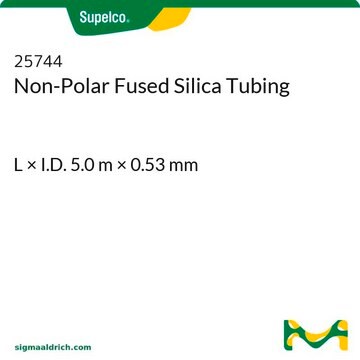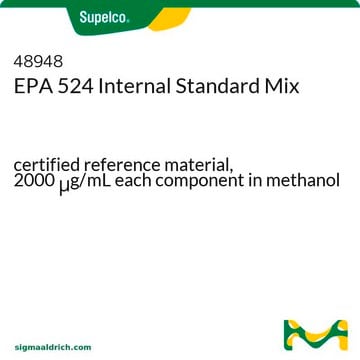54186-U
Supel™-Select HLB SPE Tube
bed wt. 1 g, volume 20 mL, pk of 20
About This Item
Recommended Products
material
PE frit (20 μm)
polypropylene hardware
quality
MS friendly
composition
bed wt., 1 g
packaging
pk of 20
technique(s)
solid phase extraction (SPE): suitable
surface area
160-420 m2/g
volume
20 mL
matrix
Hydrophilic modified styrene polymer particle platform
matrix active group
polystyrene phase
particle size
50-70 μm
pore size
80-200 Å pore size
application(s)
food and beverages
separation technique
reversed phase
Looking for similar products? Visit Product Comparison Guide
General description
Sample Matrix Compatibility: Aqueous solutions (biological fluids, water)
- Hydrophilic modified styrene polymer
- Developed for the extraction of a highly broad range of compounds from aqueous samples
- Retention predominately based on reversed-phase; however, because the phase is hydrophilic modified, it is amenable to polar compounds as well.
- Examples of more polar compounds that are retained and recovered include (but not limited to): pyridoxine (logPo/w -0.56), riboflavin (logPo/w -2.02), biotin (logPo/w 0.11).
Features and Benefits
- Excellent sample prep performance at a lower price
- Amenable to generic methodology - save time, money, and headache during method development
- Greater capacity allows for smaller bed weights = smaller elution volumes = time savings in sample processing
- Resistance to overdrying allows for more robust methdology
- Low UV and MS extractables for lower background and greater sensitivity
- Stringent production and QC guidelines offer greater lot-to-lot, tube-to-tube, and well-to-well consistency for improved accuracy and precision
Legal Information
Storage Class Code
11 - Combustible Solids
WGK
WGK 3
Flash Point(F)
Not applicable
Flash Point(C)
Not applicable
Choose from one of the most recent versions:
Already Own This Product?
Find documentation for the products that you have recently purchased in the Document Library.
Articles
Reversed-phase interaction will retain most molecules with hydrophobic character; it is very useful for extracting analytes that are very diverse in structure within the same sample.
Our team of scientists has experience in all areas of research including Life Science, Material Science, Chemical Synthesis, Chromatography, Analytical and many others.
Contact Technical Service





